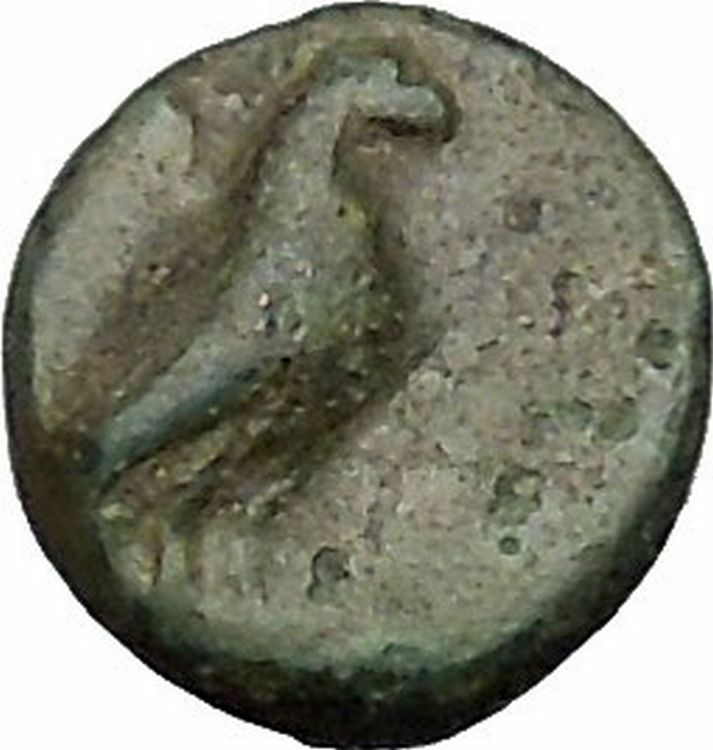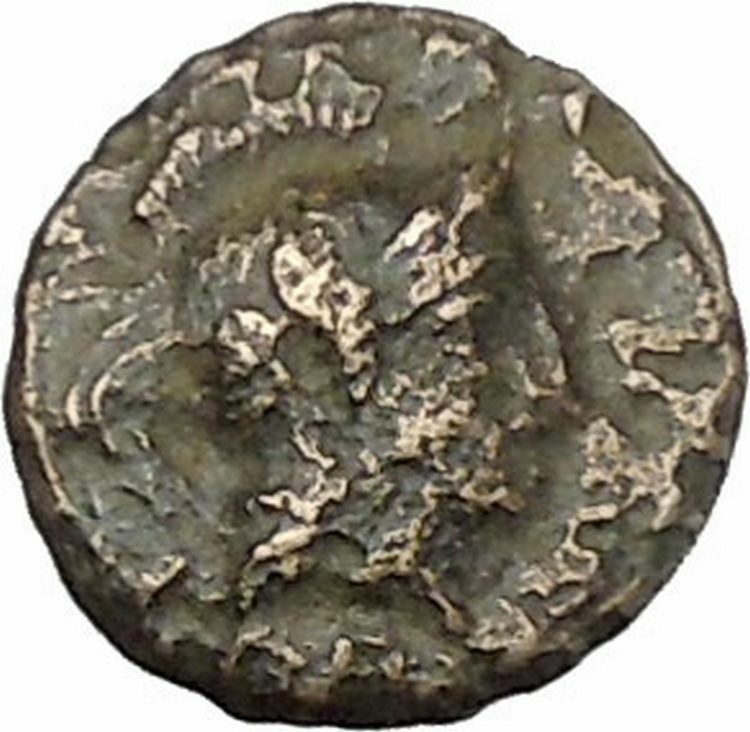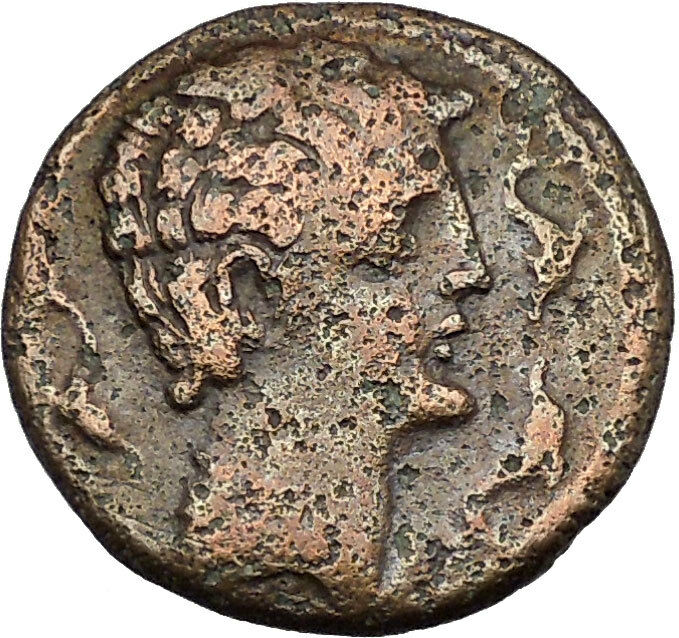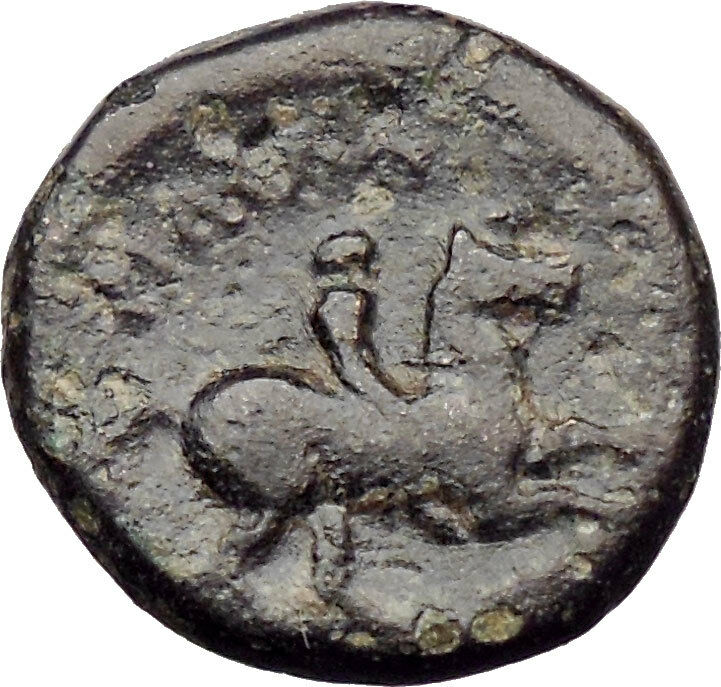|
Greek city of Kolophon in Ionia
Bronze 14mm (1.79 grams) Struck circa 360-330 B.C.
Reference: Sear 4353 var. ; B.M.C. 14.39,24 var.; Milne, Colophon 104 var.
Laureate head of Apollo right.
Forepart of galloping horse right; KO below, magistrate’s name behind.
Situated several miles inland, on the river Halesos, Kolophon was an important city and claimed to be the birthplace of Homer. It was also celebrated for the famous oracle of Apollo Klarios within its territory. One of the 12 Ionian cities of Asia Minor, was said to have been founded by Mompsus, a grandson of Tiresias. It stood about 2 miles from the coast, on the river Halesus, which was famous for the coldness of its water, between Lebedus and Ephesus, 120 stadia (12 geog. miles) from the former and 70 stadia (7 g.m.) from the latter: its harbor was called Notium. It was one of the most powerful members of the Ionian confederacy, possessing a considerable fleet and excellent cavalry; but it suffered greatly in war, being taken at different times by the Lydians, the Persians, Lysimachos, and the Cilician pirates. It was made a free city by the Romans after their war with Antiochus the Great. Besides claiming native city of Mimnermus, Hermesianax, and Nicander.
You are bidding on the exact item pictured, provided with a Certificate of Authenticity and Lifetime Guarantee of Authenticity.
 In Greek and Roman mythology, Apollo, is one of the most important and diverse of the Olympian deities. The ideal of the kouros (a beardless youth), Apollo has been variously recognized as a god of light and the sun; truth and prophecy; archery; medicine and healing; music, poetry, and the arts; and more. Apollo is the son of Zeus and Leto, and has a twin sister, the chaste huntress Artemis. Apollo is known in Greek-influenced Etruscan mythology as Apulu. Apollo was worshiped in both ancient Greek and Roman religion, as well as in the modern Greco-Roman Neopaganism. In Greek and Roman mythology, Apollo, is one of the most important and diverse of the Olympian deities. The ideal of the kouros (a beardless youth), Apollo has been variously recognized as a god of light and the sun; truth and prophecy; archery; medicine and healing; music, poetry, and the arts; and more. Apollo is the son of Zeus and Leto, and has a twin sister, the chaste huntress Artemis. Apollo is known in Greek-influenced Etruscan mythology as Apulu. Apollo was worshiped in both ancient Greek and Roman religion, as well as in the modern Greco-Roman Neopaganism.
As the patron of Delphi (Pythian Apollo), Apollo was an oracular god – the prophetic deity of the Delphic Oracle. Medicine and healing were associated with Apollo, whether through the god himself or mediated through his son Asclepius, yet Apollo was also seen as a god who could bring ill-health and deadly plague as well as one who had the ability to cure. Amongst the god’s custodial charges, Apollo became associated with dominion over colonists, and as the patron defender of herds and flocks. As the leader of the Muses (Apollon Musagetes) and director of their choir, Apollo functioned as the patron god of music and poetry. Hermes created the lyre for him, and the instrument became a common attribute of Apollo. Hymns sung to Apollo were called paeans.
In Hellenistic times, especially during the third century BCE, as Apollo Helios he became identified among Greeks with Helios, god of the sun, and his sister Artemis similarly equated with Selene, goddess of the moon. In Latin texts, on the other hand, Joseph Fontenrose declared himself unable to find any conflation of Apollo with Sol among the Augustan poets of the first century, not even in the conjurations of Aeneas and Latinus in Aeneid XII (161-215). Apollo and Helios/Sol remained separate beings in literary and mythological texts until the third century CE.
 Kolophon (Ancient Greek: Κολοφών) was an ancient city in Ionia. Founded around the turn of the first millennium BC, it was likely one of the oldest of the twelve cities of the Ionian League. In ancient times it was located between Lebedos (120 stadia to the west) and Ephesus (70 stadia to its south). Today the ruins of the city can be found south of the town Değirmendere Fev in the Menderes district of Izmir Province, Turkey. Kolophon (Ancient Greek: Κολοφών) was an ancient city in Ionia. Founded around the turn of the first millennium BC, it was likely one of the oldest of the twelve cities of the Ionian League. In ancient times it was located between Lebedos (120 stadia to the west) and Ephesus (70 stadia to its south). Today the ruins of the city can be found south of the town Değirmendere Fev in the Menderes district of Izmir Province, Turkey.
The city’s name comes from the word κολοφών, “summit”, which is also the origin of the bibliographic term “colophon”, in the metaphorical sense of a ‘crowning touch’, as it was sited along a ridgeline. The term colophony for rosin comes from the term colophonia resina, that is, resin from the pine trees of Colophon, which was highly valued for the strings of musical instruments.
History
 According to Apollodorus and Proclus, the mythical seer Calchas died at Colophon after the end of the Trojan War. Strabo names Clarus as the place of his death, which would later be a cult center in the territory of Colophon. An oracle had it that he would die when he would meet a better seer than himself. As Calchas and the other heroes on their way home from Troy came upon the seer Mopsus in Colophon, the two competed in their mantic qualities. Calchas couldn’t equal Mopsus’ skills as a seer, being a son of Apollo and Manto, so he died. According to Apollodorus and Proclus, the mythical seer Calchas died at Colophon after the end of the Trojan War. Strabo names Clarus as the place of his death, which would later be a cult center in the territory of Colophon. An oracle had it that he would die when he would meet a better seer than himself. As Calchas and the other heroes on their way home from Troy came upon the seer Mopsus in Colophon, the two competed in their mantic qualities. Calchas couldn’t equal Mopsus’ skills as a seer, being a son of Apollo and Manto, so he died.
In Greek antiquity two sons of Codrus, King of Athens, established a colony there. It was the birthplace of the philosopher Xenophanes and the poets Antimachus and Mimnermus.
Colophon was the strongest of the Ionian cities and renowned both for its cavalry and for the inhabitants’ luxurious lifestyle, until Gyges of Lydia conquered it in the 7th century BC. Colophon then went into decline and was eclipsed by neighbouring Ephesus and by the rising naval power of Ionia, Miletus.
After the death of Alexander the Great, Perdiccas expelled the Athenian settlers on Samos to Colophon, including the family of Epicurus, who joined them there after completing his military service.
In the 3rd century BC, it was destroyed by Lysimachus-a Macedonian officer, one of the successors (Diadochi) of Alexander the Great, later a king (306 BC) in Thrace and Asia Minor, during the same era when he nearly destroyed (and did depopulate by forced expulsion) the neighboring Ionian League city of Lebedos.
Notium served as the port, and in the neighbourhood was the village of Clarus, with its famous temple and oracle of Apollo Clarius, where Calchas vied with Mopsus in divinatory science.
In Roman times, after Lysimachus’ conquest, Colophon failed to recover (unlike Lebedos) and lost its importance; actually, the name was transferred to the site of the port village of Notium, and the latter name disappeared between the Peloponnesian War and the time of Cicero (late 5th century BC to 1st century BC).
Additionally, the city, as a major location on the Ionic mainland, was cited as a possible home or birthplace for Homer. In his True History, Lucian lists it as a possible birthplace along with the island of Khios and the city of Smyrna, though Lucian’s Homer claims to be from Babylon.
Bishopric
While tradition gave as the first bishops of the bishopric of Colophon Sosthenes (Acts 18:17 and 1 Corinthians 1:1) and Tychicus (Titus 3:12), the only ones historically documented are Eulalius or Euthalius, who was at the First Council of Ephesus in 431, and Alexander who was represented at the Council of Chalcedon in 451, without attending it personally.
Colophon continued to be listed in Notitiae Episcopatuum as late as the 12th or 13th century, as a suffragan of Ephesus, capital of the Roman province of Asia.
No longer a residential bishopric, Colophon is today listed by the Catholic Church as a titular see.
|





 In Greek and Roman mythology, Apollo, is one of the most important and diverse of the Olympian deities. The ideal of the kouros (a beardless youth), Apollo has been variously recognized as a god of light and the sun; truth and prophecy; archery; medicine and healing; music, poetry, and the arts; and more. Apollo is the son of Zeus and Leto, and has a twin sister, the chaste huntress Artemis. Apollo is known in Greek-influenced Etruscan mythology as Apulu. Apollo was worshiped in both ancient Greek and Roman religion, as well as in the modern Greco-Roman Neopaganism.
In Greek and Roman mythology, Apollo, is one of the most important and diverse of the Olympian deities. The ideal of the kouros (a beardless youth), Apollo has been variously recognized as a god of light and the sun; truth and prophecy; archery; medicine and healing; music, poetry, and the arts; and more. Apollo is the son of Zeus and Leto, and has a twin sister, the chaste huntress Artemis. Apollo is known in Greek-influenced Etruscan mythology as Apulu. Apollo was worshiped in both ancient Greek and Roman religion, as well as in the modern Greco-Roman Neopaganism. Kolophon (Ancient Greek: Κολοφών) was an ancient city in Ionia. Founded around the turn of the first millennium BC, it was likely one of the oldest of the twelve cities of the Ionian League. In ancient times it was located between Lebedos (120 stadia to the west) and Ephesus (70 stadia to its south). Today the ruins of the city can be found south of the town Değirmendere Fev in the Menderes district of Izmir Province, Turkey.
Kolophon (Ancient Greek: Κολοφών) was an ancient city in Ionia. Founded around the turn of the first millennium BC, it was likely one of the oldest of the twelve cities of the Ionian League. In ancient times it was located between Lebedos (120 stadia to the west) and Ephesus (70 stadia to its south). Today the ruins of the city can be found south of the town Değirmendere Fev in the Menderes district of Izmir Province, Turkey. According to Apollodorus and Proclus, the mythical seer Calchas died at Colophon after the end of the Trojan War. Strabo names Clarus as the place of his death, which would later be a cult center in the territory of Colophon. An oracle had it that he would die when he would meet a better seer than himself. As Calchas and the other heroes on their way home from Troy came upon the seer Mopsus in Colophon, the two competed in their mantic qualities. Calchas couldn’t equal Mopsus’ skills as a seer, being a son of Apollo and Manto, so he died.
According to Apollodorus and Proclus, the mythical seer Calchas died at Colophon after the end of the Trojan War. Strabo names Clarus as the place of his death, which would later be a cult center in the territory of Colophon. An oracle had it that he would die when he would meet a better seer than himself. As Calchas and the other heroes on their way home from Troy came upon the seer Mopsus in Colophon, the two competed in their mantic qualities. Calchas couldn’t equal Mopsus’ skills as a seer, being a son of Apollo and Manto, so he died.




